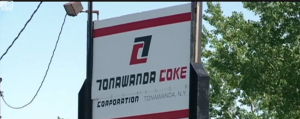A coal plant outside of Buffalo, NY was issued one of the largest fines ever imposed criminally on a company for violating the Clean Air Act.
 On Wednesday, March 19th, Tonawanda Coke Corp. was fined $12.5 million for knowingly and illegally releasing hundreds of tons of the carcinogen benzene into the air for five years and improperly conducting hazardous sludge on the ground. The company will also pay for two separate environmental studies with a price tag of $12.2 million. These two 10-year studies will look at emissions and examine soil samples.
On Wednesday, March 19th, Tonawanda Coke Corp. was fined $12.5 million for knowingly and illegally releasing hundreds of tons of the carcinogen benzene into the air for five years and improperly conducting hazardous sludge on the ground. The company will also pay for two separate environmental studies with a price tag of $12.2 million. These two 10-year studies will look at emissions and examine soil samples.
On top of that, the Tonawanda Coke Corp. environmental controls manager faces a year and a day in jail, 100 hours of community service and a $20,000 fine. He was also found guilty of obstruction of justice for covering up the pollution during plant inspections by regulators.
Community Outrage
Residents have complained about the black soot from the coal plant for a decade and many are worried about the health implications to the community.
In 2005, local residents concerned for their health joined together to form the Clean Air Coalition. They began sampling air quality by using buckets and plastic bags. They also petitioned state and federal agencies to investigate the plants operations. After finding elevated levels of benzene in the community, federal agencies raided the plant in 2009 when levels were 75 times higher than state and federal law permit.
A three-year health study completed last year by the State Health Department and Department of Environmental Conservation found elevated rates of lung and bladder cancers in men and women, and elevated esophageal cancer in men and uterine cancer in women.

Jackie James-Creedon, of Citizen Science Community Resources, said she was very pleased that the plant will fund a soil testing project she has been working on for years.
Photo by Don Heupel
“Back in 2005, we just wanted a clean environment for us to live. We wanted our air to be cleaner. We wanted to know why everyone was sick. We had no clue they were breaking the law,” Jackie James-Creedon said. James-Creedon is a resident fighting this case, suffers from fibromyalgia and is a resident that submitted one of the 10-year studies.
Repeat Offenders
This is not the first time Tonawanda Coke Corp. has been in the hot seat for environmental violations. Last March the company was found guilty of 11 violations of the Clean Air Act and three counts of violating the Resource Conservation and Recovery Act.
According to Eli George, producer for WIVB 4, Tonawanda coke hid a unreported pressure relief valve and operated a coke-quenching tower without baffles, a pollution control device. Hazardous waste was stored, treated and disposed without a permit and mixed its coal tar sludge on the ground.
U.S. Attorney William Hochul said, “These two defendants over a period of 10 years released, intentionally, literally hundreds of tons of poisonous benzene gas.”
Last year in April the company was found guilty of 11 violations of the Clean Air Act, three counts for violating the Resource Conservation and Recovery Act (RCRA) and a maximum penalty of $295 million in fines while its former environmental manager faced 75 years in prison.
In September, Environmental Advocates group released a report on the one-third cuts on staff in the New York’s Department of Environmental Conservation and the 75 percent fewer inspections on factories and power plants.
According to North County Public Radio, inspections for power plants were down 44 percent and inspection on potential water pollution sites were down 74 percent while enforcement actions against polluters was found down 24 percent.
Judge William Skretny declined to address the issue of individual harm or designate residents as victims at the sentencing hearing that would give them entitlement to speak. He did however acknowledge the damage inflicted by repeated exposure to cancer-causing toxins between 2005 and 2009.
“Individuals living with the fear of the unknown and the future risk of illness, that’s harm,” the judge said.
The Environmental Protection Agency and the Occupational Safety and Health Administration are also looking into this case.
There will still be a challenge, to the ruling on the criminal case, but prosecutors said the five-year term of probation will give governmental agencies authority to conduct inspections and monitor the plant.
“There’s still more work to be done. This is an important chapter, but the book is not completely written and we have to keep protecting the public’s health, “ EPA Regional Administrator Judith Enck said following the sentencing. “We are committed to cleaning the place up.”



